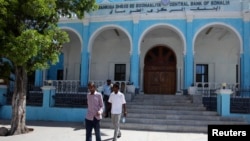Somalia's central bank governor has resigned less than two months into the job, citing pressure to authorize improper deals, diplomats said on Monday.
The departure of Yussur Abrar, the first woman to occupy the post, is a blow to foreign donors pumping billions of dollars in aid money into a Horn of Africa country grappling with an Islamist insurgency.
It will also embarrass the government of Somalia, which has been promising to enforce higher standards in its management of state accounts. It has dismissed previous allegations by a U.N. group of experts of corruption at the central bank.
Somali officials were not available or offered no immediate comment when asked, although Reuters made repeated attempts to contact them since last week. Abrar did not respond to an email sent to her by Reuters.
Somalia's federal government, whose control barely extends beyond the boundaries of the capital Mogadishu, has very few sources of revenue and relies heavily on aid as it tries to rebuild institutions and an economy shattered by two decades of war and chaos.
One senior diplomat said the resignation of Abrar had rattled donors who have said cleaner management of public finances is vital to securing a fragile economic recovery, debt relief and budget support.
“What [Abrar's resignation] has done is woken up a lot of people,” said one senior European diplomat. “The notion that there is a blank check for Somalia, that's over. There's got to be results for money.”
His comments were echoed by two other diplomats and by one source with a close knowledge of Somalia affairs.
Abrar's predecessor, Abdusalam Omer, quit in September after U.N. monitors linked him to irregularities regarding millions of dollars withdrawn from the central bank. Omer denied the allegations.
The election by parliament in September last year of President Hassan Sheik Mohamud, a relative political new-comer, was hailed by his supporters and donors as a vote for change.
Western allies have poured money into Somalia, wary of a slide back into anarchy and all-out war in a country foreign capitals consider a hotbed of Islamic militancy.
The U.N. Monitoring Group on Somalia and Eritrea said in July that Mogadishu's central bank had become a “slush fund” for political leaders and that Omer had played a central role in irregularities surrounding unaccountable disbursements.
The government said international investigators, commissioned by Mogadishu, had cleared it of those accusations.
The departure of Yussur Abrar, the first woman to occupy the post, is a blow to foreign donors pumping billions of dollars in aid money into a Horn of Africa country grappling with an Islamist insurgency.
It will also embarrass the government of Somalia, which has been promising to enforce higher standards in its management of state accounts. It has dismissed previous allegations by a U.N. group of experts of corruption at the central bank.
Somali officials were not available or offered no immediate comment when asked, although Reuters made repeated attempts to contact them since last week. Abrar did not respond to an email sent to her by Reuters.
Somalia's federal government, whose control barely extends beyond the boundaries of the capital Mogadishu, has very few sources of revenue and relies heavily on aid as it tries to rebuild institutions and an economy shattered by two decades of war and chaos.
One senior diplomat said the resignation of Abrar had rattled donors who have said cleaner management of public finances is vital to securing a fragile economic recovery, debt relief and budget support.
“What [Abrar's resignation] has done is woken up a lot of people,” said one senior European diplomat. “The notion that there is a blank check for Somalia, that's over. There's got to be results for money.”
His comments were echoed by two other diplomats and by one source with a close knowledge of Somalia affairs.
Abrar's predecessor, Abdusalam Omer, quit in September after U.N. monitors linked him to irregularities regarding millions of dollars withdrawn from the central bank. Omer denied the allegations.
The election by parliament in September last year of President Hassan Sheik Mohamud, a relative political new-comer, was hailed by his supporters and donors as a vote for change.
Western allies have poured money into Somalia, wary of a slide back into anarchy and all-out war in a country foreign capitals consider a hotbed of Islamic militancy.
The U.N. Monitoring Group on Somalia and Eritrea said in July that Mogadishu's central bank had become a “slush fund” for political leaders and that Omer had played a central role in irregularities surrounding unaccountable disbursements.
The government said international investigators, commissioned by Mogadishu, had cleared it of those accusations.





